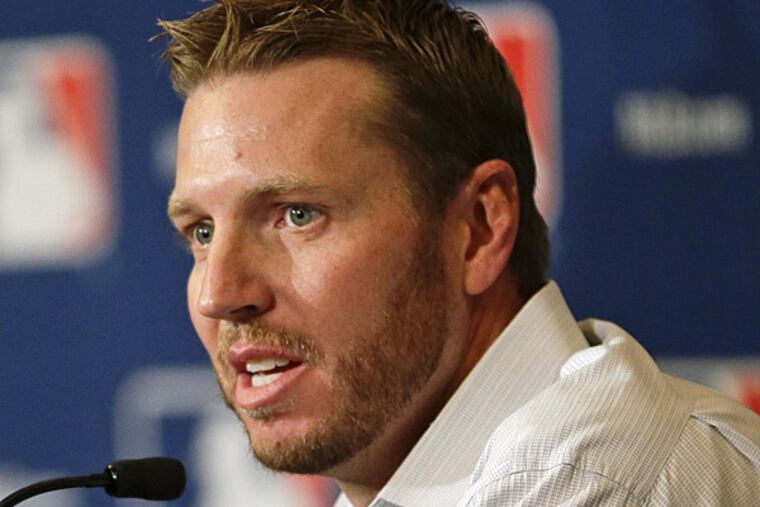Halladay calls it a career with class
Roy Halladay got 16 years of relative fame from a career in major-league baseball, but when it came time to reflect and say farewell to a professional life that spanned nearly half his time on earth, Halladay was accorded just a half-hour before being preempted.

Roy Halladay got 16 years of relative fame from a career in major-league baseball, but when it came time to reflect and say farewell to a professional life that spanned nearly half his time on earth, Halladay was accorded just a half-hour before being preempted.
That's no knock on either Comcast SportsNet or the MLB Network, both of which cut away from Halladay's retirement news conference on Monday; Comcast to bring you Chip Kelly quoting Winston Churchill and the MLB Network to continue talking about whatever it is they talk about there between November and February.
It is the nature of things that yesterday is a lot less interesting than today, and Halladay began his fade into yesterday when he chose to end a losing battle with his injured back and call it a career. He had his say, thanked those he wanted to thank, answered some questions, and by that time the TV producers could hear the audience jangling the keys in its pocket. Nothing more to see here. Catch you in five years at the Hall of Fame announcement.
For his part, and this was no surprise at all, Halladay handled his announcement with dignity and class and honesty, which is also how he handled his playing career. Halladay was a straightforward player, because that was the kind of path he always took and the direction he always tried to go. When he could no longer pitch to his own exacting standards, after trying to work the corners on age and injury for a couple of seasons, he was straight with himself, too, which is almost as rare for elite athletes as are the gifts that make them special in the first place.
"To go out there and know that it's probably not going to feel very good and I'm not going to be able to do things the way I want to do them was very frustrating. Not only personally, but I felt like there was a certain responsibility that I owed to my teammates, to the organization, so that part was definitely challenging for me," Halladay said. "You're trying to give everything you can, but there is something holding you back."
Halladay came late to the party here, joining the Phillies in 2010 after spending his first 12 seasons with the Blue Jays, and he missed the best part of it. He wasn't on the team for either World Series appearance during the recent run of success, and only had two seasons before his body really began to betray him.
Those were very special years, though; a perfect game, a no-hitter in the first postseason appearance of his career, two memorable duels with Tim Lincecum in the 2010 NL championship, and then the excitement of the 102-win team in 2011 that was followed so quickly by the devastating opening-round loss to St. Louis. Halladay went eight innings and gave up one run in the deciding game, but that wasn't good enough. Although no one knew it at the time, both his career and the best era in Phillies' history had reached the top of the roller-coaster ride and was beginning a descent.
Halladay's retirement is just one in a string of those from the glory days that will take place in the next few years. We've already seen Brad Lidge and Pat Burrell, and not that far behind will be Ryan Howard, Chase Utley, Jimmy Rollins, Cliff Lee and Carlos Ruiz (although not so you can tell if judging by Ruben Amaro Jr.'s actions). Maybe Shane Victorino will come back to retire here eventually, maybe not. And don't look now, but Cole Hamels turns 30 in two weeks.
It doesn't take outside circumstances to break up a good team. Time will do just fine all by itself.
"It was a tremendous run," Halladay said of his career, which included 203 wins, two Cy Young Awards, more than 2,000 strikeouts, but not a single World Series appearance in those 16 seasons. "I always knew how tough it was to win a World Series. . . . The one thing I took away from that is you can have the best team on paper, you can have the guys who want it the most, but when the squirrel runs across home plate while your team is trying to pitch, there is nothing you can do about that. So you really start to realize there are a lot of things out of your control."
Nothing is more uncontrollable than the turning of the clock, however, and Halladay finally gave into that reality on Monday. He had his say and made his thank-you's, answered the questions, and then drifted into baseball's cavernous yesterday.
Roy Halladay closed this one out perfectly, too. If the memory of his career lasts a thousand years, they'll say this was his finest half-hour.
@bobfordsports